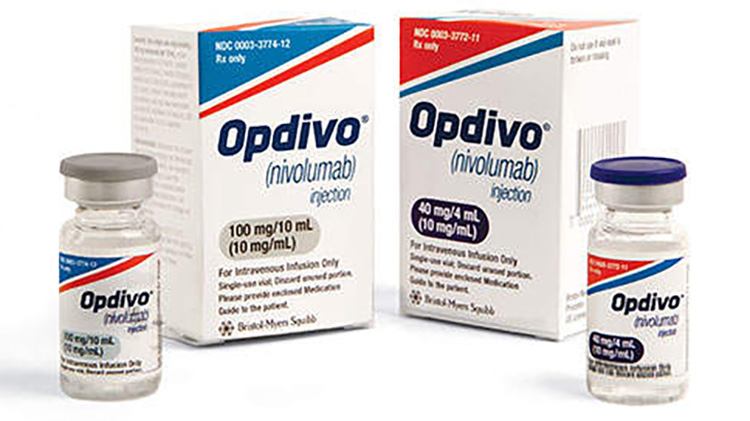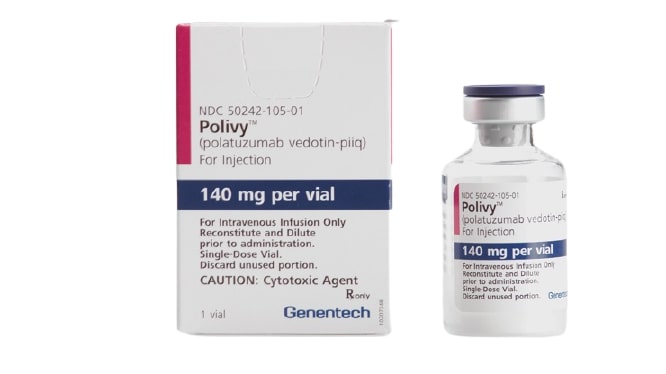Opdivo (Nivolumab) vs Polivy (polatuzumab vedotin-piiq)
Opdivo (Nivolumab) vs Polivy (polatuzumab vedotin-piiq)
Opdivo (Nivolumab) is an immune checkpoint inhibitor that works by blocking the PD-1 protein on T cells, thereby enhancing the immune system's ability to attack cancer cells, and is commonly used in the treatment of various cancers including melanoma, lung cancer, and kidney cancer. Polivy (polatuzumab vedotin-piiq), on the other hand, is an antibody-drug conjugate that targets CD79b, a protein expressed on the surface of B cells, and is used specifically for the treatment of diffuse large B-cell lymphoma (DLBCL), often in combination with other chemotherapy drugs. The choice between Opdivo and Polivy would largely depend on the type of cancer being treated, as their mechanisms of action and approved indications differ significantly; therefore, a healthcare provider would recommend the most appropriate medication based on the patient's specific cancer diagnosis and overall health condition.
Difference between Opdivo and Polivy
| Metric | Opdivo (Nivolumab) | Polivy (polatuzumab vedotin-piiq) |
|---|---|---|
| Generic name | Nivolumab | Polatuzumab vedotin-piiq |
| Indications | Various types of cancer, including melanoma, lung cancer, and renal cell carcinoma | Treatment of diffuse large B-cell lymphoma |
| Mechanism of action | PD-1 inhibitor that enhances the immune response against cancer cells | Antibody-drug conjugate targeting CD79b, delivering a cytotoxic agent to B-cells |
| Brand names | Opdivo | Polivy |
| Administrative route | Intravenous infusion | Intravenous infusion |
| Side effects | Fatigue, rash, musculoskeletal pain, nausea, and pruritus | Neutropenia, thrombocytopenia, anemia, peripheral neuropathy, and diarrhea |
| Contraindications | Known hypersensitivity to nivolumab or any of its excipients | Known hypersensitivity to polatuzumab vedotin-piiq, or any of its excipients |
| Drug class | Immune checkpoint inhibitor | Antibody-drug conjugate |
| Manufacturer | Bristol-Myers Squibb | Genentech, Inc. |
Efficacy
Efficacy of Opdivo (Nivolumab) in Lymphoma
Opdivo (Nivolumab) is a PD-1 (Programmed Death-1) immune checkpoint inhibitor that has shown efficacy in the treatment of certain types of lymphoma. Specifically, it has been approved by the FDA for the treatment of classical Hodgkin lymphoma (cHL) after failure of autologous hematopoietic stem cell transplantation (HSCT) or after two or more lines of systemic therapy for those who are not HSCT candidates. Clinical trials have demonstrated that nivolumab can induce a durable response in relapsed or refractory cHL, with a significant proportion of patients achieving partial or complete remission. The efficacy of Opdivo in other lymphoma subtypes continues to be investigated in clinical trials.
Efficacy of Polivy (Polatuzumab Vedotin-piiq) in Lymphoma
Polivy (Polatuzumab Vedotin-piiq) is an antibody-drug conjugate targeting CD79b, a protein expressed on the surface of B cells, and is used in the treatment of certain types of non-Hodgkin lymphoma (NHL). It has been granted accelerated approval by the FDA for use in combination with bendamustine and a rituximab product (BR) for the treatment of adult patients with relapsed or refractory diffuse large B-cell lymphoma (DLBCL), not otherwise specified, after at least two prior therapies. Clinical studies have shown that the addition of Polivy to BR significantly improves overall response rates and can lead to complete remissions in a subset of patients with this aggressive form of lymphoma.
Comparative Efficacy in Lymphoma Treatment
While both Opdivo and Polivy have demonstrated efficacy in the treatment of different types of lymphoma, their mechanisms of action and indications differ. Opdivo works by blocking the PD-1 pathway, enhancing the immune system's ability to fight cancer cells, and is used in cHL. On the other hand, Polivy delivers a cytotoxic agent directly to B cells in NHL, particularly DLBCL. Both drugs represent important advancements in the management of these hematologic malignancies and offer hope for patients who have limited treatment options due to disease relapse or refractoriness to previous therapies.
Considerations and Ongoing Research
It is important to note that while these medications have shown promise, their efficacy can vary among individuals, and they are not without potential side effects. Ongoing research continues to evaluate the long-term efficacy and safety of Opdivo and Polivy, as well as their potential use in other lymphoma subtypes or in combination with other therapies. Clinical trials are essential for understanding the full potential and optimal use of these drugs in the diverse landscape of lymphoma treatment.
Regulatory Agency Approvals
Opdivo
-
European Medical Agency (EMA), European Union

-
Food and Drug Administration (FDA), USA

-
Health Canada

-
Pharmaceuticals and Medical Devices Agency (PMDA), Japan

-
Therapeutic Goods Administration (TGA), Australia

-
Medsafe (NZ)

Polivy
-
Food and Drug Administration (FDA), USA

-
Pharmaceuticals and Medical Devices Agency (PMDA), Japan

-
Therapeutic Goods Administration (TGA), Australia

Access Opdivo or Polivy today
If Opdivo or Polivy are not approved or available in your country (e.g. due to supply issues), you can access them via Everyone.org.
How it works

Make an enquiry
Choose the medicine you want to buy, answer a couple of questions, and upload your prescription to speed things up. We’ll get back to you within 24 hours.


Make an enquiry
Choose the medicine you want to buy, answer a couple of questions, and upload your prescription to speed things up. We’ll get back to you within 24 hours.


Breeze through the paperwork
We'll guide you through the required documents for importing unapproved medicine, ensuring you have all the necessary information.


Get a personalized quote
We’ll prepare a quote for you, including medicine costs and any shipping, administrative, or import fees that may apply.


Receive your medicine
Accept the quote and we’ll handle the rest - sourcing and safely delivering your medicine.

Some text on this page has been automatically generated. Speak to your physician before you start a new treatment or medication.
Let's talk
If you have any questions, call us or send us a message through WhatsApp or email:
Contact us




